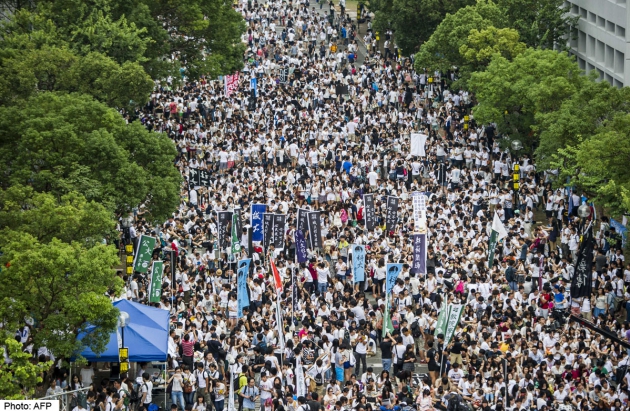The White House, which had maintained a neutral stance regarding attempts by Hong Kong citizens to regain universal suffrage in the face of Chinese national oppression, changed its position Monday and supported democracy in Hong Kong.
“The United States supports universal suffrage in Hong Kong in accordance with the Basic Law and we support the aspirations of the Hong Kong people,” said White House spokesman Josh Earnest in a press briefing, Monday.
“We believe that the basic legitimacy of the chief executive in Hong Kong will be greatly enhanced if the Basic Law’s ultimate aim of selection of the chief executive by universal suffrage is fulfilled,” said Earnest.
“We have consistently made our position known to Beijing, and will continue to do so.”
“We do not take sides in the discussion of Hong Kong’s political development, nor do we support any particular individuals or groups involved in it. We encourage all sides to refrain from actions that would further escalate tensions, to exercise restraint, and to express views on the SAR’s political future in a peaceful manner.”
The US government had faced criticism in recent weeks for an apparent lack of action regarding the events in China.
Tens of thousands of Hong Kong citizens have been demonstrating for their right to universal suffrage over the past week, after the Chinese government decided it would only allow political candidates to run for the 2017 elections in Hong Kong who met the approval of the Central People’s Government of the People’s Republic of China (CPC).
By Day Blakely Donaldson

United States as a Supporter
The United States has every reason to be involved in the vote in Hong Kong. People that are calling out for help in such a way shouldn’t be ignored. With “75 percent of residents aged 18 to 29 [distrusting] the Chinese government, [and] 85 percent [expressing] little or no confidence in ‘one country, two systems,’” (2014) I find it hard to believe that the United States should avoid this. These situations have manifested before and they led to change through a horrible process. This process however, is necessary in providing for the people exactly what they want. Why should a people be oppressed by their government? Is the government assumed to be correct at any question? The government should be there to accommodate the benefit of all the people and should it not then that’s reason enough to incite change. It isn’t bewildering to hear that a stronger, more established entity such as the United States would lend a hand to a group of people that are in need of help. While it may be in an isolationist’s style to ignore the issues of others, the United States is almost obliged to assist in this due to the history it holds. When the United States waited on entering World War II we were eventually drawn into it anyways. By taking a stance now, we establish ourselves and our reliability to others.
Sources:
Schiavenza, M. (2014, 10 16). The cost of China’s determination in Hong Kong. The Atlantic. Retrieved from http://www.theatlantic.com/international/archive/2014/10/the-cost-of-chinas-determination-in-hong-kong/381519/
Sadly, a White House that must be led to the conclusion that as the world’s foremost democracy we have a moral obligation to speak out against mainland China’s strangle hold on Hong Kong’s rights. Where are today’s Democrats in the vein of Roosevelt, Truman, Stevenson and Kennedy? I worry for us as much as Hong Kong Chinese.
more balls then I expected in the U.S foreign policy, less then I would have liked. Then again, Im not a politician,